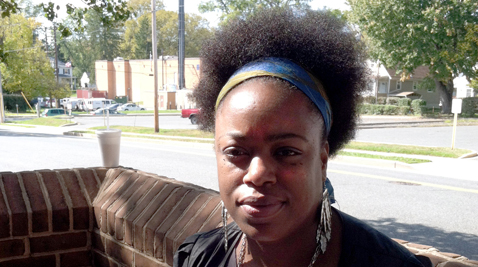BEL AIR — Bel Air mother of four Letisha Hill has been unemployed for a year. In that time, she has taken seasonal temp work, sold her car and moved her family in with her aunt, all to keep her children from poverty.
As it turns out, they are already there.
Her own estimate of her yearly income from sporadic work and monthly child support payments put her under the government’s $27,010 poverty threshold for a family of five. Hill is part of an increasing trend of families with children facing poverty, even in relatively prosperous Harford County.

As a whole, Maryland has the second-lowest child poverty rate in the country. From 2007 to 2011, the rate has increased 3 percent to 13.5 percent.
Harford County, considered fairly stable by economic experts, has seen a post-recession increase in child poverty of 10.2 percent since 2007, the largest statistically significant increase within the state, excluding Baltimore City, according to American Community Survey data.
It is not clear why child poverty in Harford County increased at a rate higher than the state.
The county’s average family income was $78,123, below the state average of $83,823. And the Maryland Department of Human Resources has not noticed a correlating increased demand for their services.
Maryland’s Food Supplement Program reached 58 percent more households with children in Harford County between December 2008 and June 2012. Overall, Harford County’s food stamp participation is below the state average, according to Human Resources Communications Director Brian M. Schleter.
Hill’s attitude may hold a clue for the agency as to why their numbers have not shown a significant increase.
Hill’s income could make her eligible for the welfare services that the Department of Human Resources offers, but she says she will not apply.
“I don’t want to take from someone else that might really need it,” she said, despite having given up her rented home, car and cell phone to make ends meet.
Hill said she tries to insulate her children — ages 20, 14, 11 and 10 — from the economic hardships she is facing. She will not touch the money in her children’s bank accounts that she saved during better times. While her accounts are overdrawn, the children have a few thousand each for their education, she said.
“I don’t want them to feel poor,” she said.
Hill’s case is an illustration of the clear connection between employment and child poverty. She was able to save for the future when she was fully employed and, now her income puts her and her children below the poverty line.
Harford County saw unemployment rise 4.4 percent between 2007 and 2011, according to the census, which was only about 1 percentage point above average for the state.
Despite the relatively moderate increase in unemployment, Anirban Basu of Sage Policy Group speculated that the child poverty rate may have something to do with the kids of jobs that are available. He noted that while the Defense Department’s Base Realignment and Closure process brought more skilled jobs to Aberdeen, the families hit hardest by the economic downturn, and therefore more likely to experience poverty, were those working in construction and retail, which require a different skill set.
“Those parts of the economy have not been as stable,” he said. “Many of these people would be classified as the working poor,” he added, “now their children are associated with impoverished income levels.”
Like other areas throughout the state, Harford County had several big employers leave the county post-recession.
The 2009 closure of Harford Duracool, which made large refrigeration units, cost the county 60 jobs, according to Director of Economic Development Jim Richardson. Records filed with the Maryland Department of Labor and Licensing put the number at 84.
The closure of Sparrows Point Steel Mill in Baltimore County earlier this year put about 275 Harford County residents out of a job, said Richardson. That loss would not figure into the 2011 American Community Survey.
The Vertis owned-printing plant in Belcamp closed in 2009 after its main customer, the Baltimore Examiner folded. It left 105 employees without jobs.
Local construction firms, such as Gemcraft Homes, and regional builders like Ryan Homes, drastically reduced their workforce after the collapse of the housing market.
“If there was loss, it was the loss of jobs in the construction industry and the retail side,” said Richardson.
While there are now more opportunities in the county, “The people that are unemployed are not able to take those jobs. The reason being is that there is mismatch of skills,” he said.
The expansion of Aberdeen Proving Ground under BRAC brought 8,500 federal jobs and 8,000 private sector jobs to the area, he said adding, “Those require a high level of education.”
A new Kohl’s E-Commerce center, essentially a warehouse for online shopping, should offer more opportunities for people who have experience in retail and distribution, said Richardson. The project is estimated to create 800 jobs, he said.
Through county employment services, Hill applied for a job at the Kohl’s E-Commerce center but, she is not sure how she will be able to manage the commute to Edgewood since she had to get rid of her car seven months ago because she couldn’t afford the insurance payments.
Eventually, Hill would like to open a jewelry store and be her own boss. She studied computer science and is enrolled in online business courses to prepare herself for a wider variety of job opportunities.
“I’m trying to make sure I can do everything for my kids and do my school at the same time,” she said.


You must be logged in to post a comment.